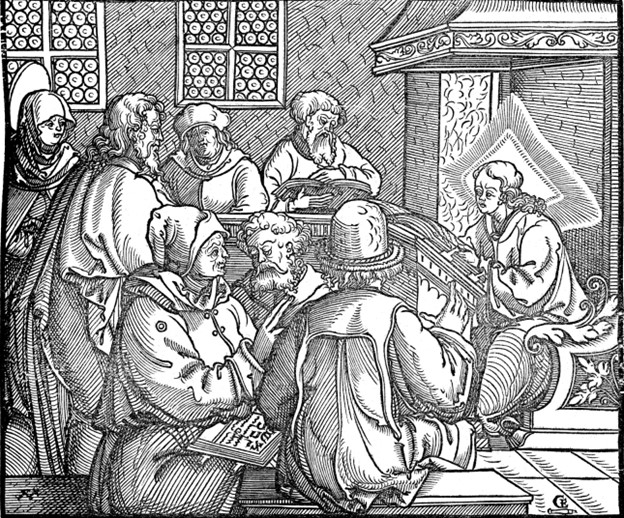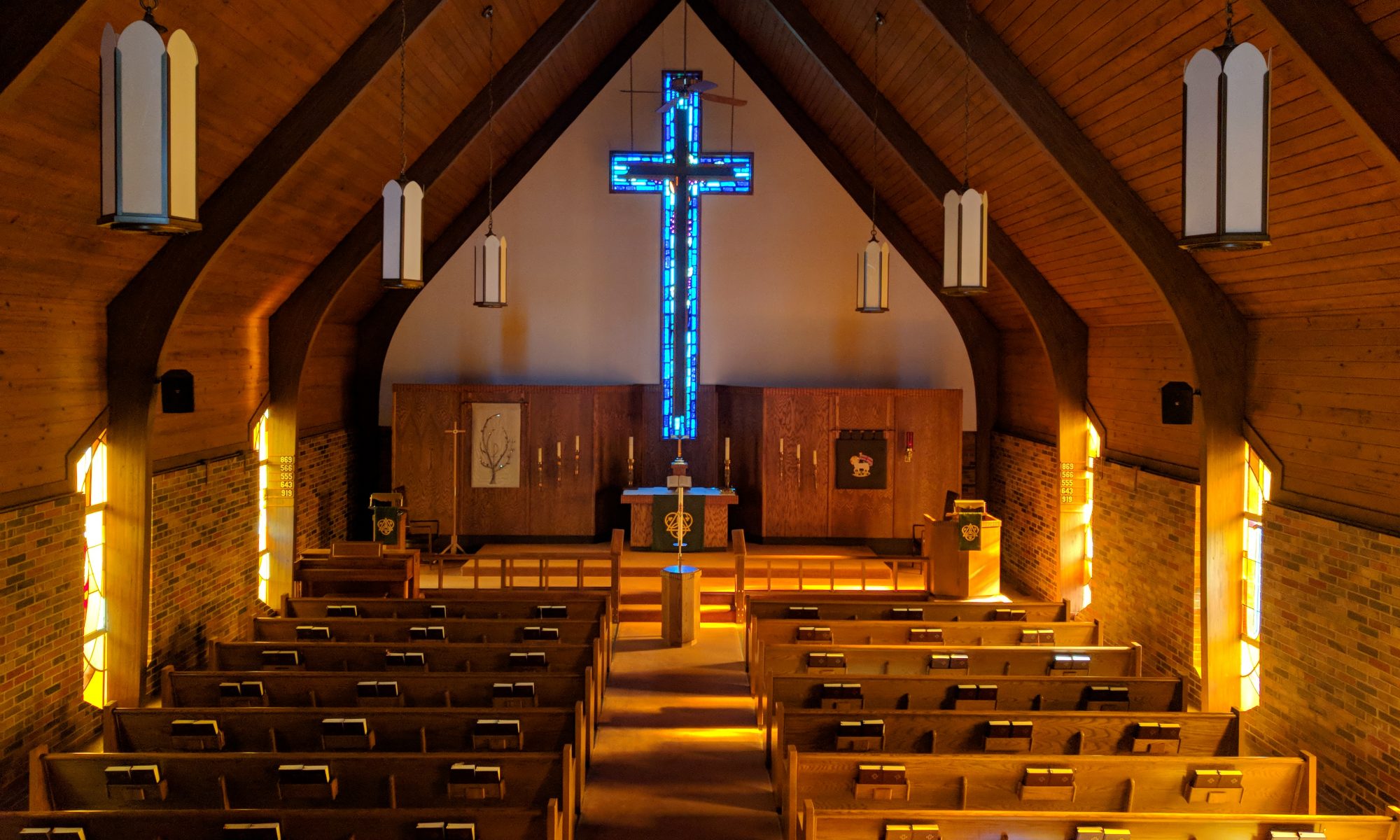
Lessons: Isaiah 42:1-9, Romans 12:1-5, Luke 2:41-52
Hymns: LSB 410, 839, 394, 401, 384
Grace, mercy, and peace to you from God our Father and our Lord and Savior, Jesus Christ. Amen.
On Christmas Eve, we began reading Luke 2. Today, we finished the chapter. Last Saturday and Sunday, we read the middle portion of Luke 2. It is rare when the dates in the Church Year all line up to not only read the entire chapter, but to do so in order.
Anyway, in this chapter we heard of the events surrounding our Lord’s birth. And from Matthew 2 on Friday (the Epiphany), we heard the visitation of the Magi. Once Joseph learns Herod wants to kill all the baby boys in Bethlehem, the holy family flees to Egypt to take asylum there while King Herod seethes his bitter anger over the potential competition with a Toddler who is called a King. Within a few years, King Herod dies, and the family moves back to Nazareth in Galilee. Jesus grows in wisdom and stature. The family fulfills God’s will in going to Jerusalem annually for the Passover.
Just think what that would mean for the young Jesus. The Passover was instituted when God released the people of Israel from slavery in Egypt. At first, Pharoah would not let them go, because he knew they were too valuable of a workforce. He even endured nine plagues until finally he let them go after the tenth plague—the Passover. This is when God sent an angel to kill the firstborn in all Egypt.
The Israelites were spared of death. They were instructed to kill a lamb and spread its blood on their doorposts. They roasted the animal and ate it. They were instructed to do this in haste and be ready—with belts fastened, staffs in their hands and sandals on their feet—to flee at moment’s notice. When Egypt began to wake up, there was a great cry throughout the land. Even Pharoah’s own firstborn was dead, so he let the Hebrew people go. Eventually, the people of Israel made it to the Promised Land—their own land—a land flowing with milk and honey.
Annually, the Israelites observed the Passover. They continued to kill lambs and eat them, draining their blood. This feast not only reminded them of the mercy God had on their people, but it also taught them of two additional realities. First, God was forgiving them of their sin—releasing them of their bondage to sin—and leading them to the Promised Land of Heaven. Second—and the most important aspect of the annual Passover feast—it pointed God’s people ahead to the coming Messiah who would serve as the Passover Lamb. God’s promised Son would come into the world, take the blame for committing our sin, bear our many sins in His Body, and shed His Blood on the cross to atone for our countless sins.
When Jesus arrived in Jerusalem for the Passover feast, He would witness the many animals that were sacrificed. He knew these sacrifices prefigured the sacrifice He would make on the cross. He saw the harsh nature of death through these sacrificial animals and, as a result, saw how enormous the burden of sin truly is. The death Jesus would endure for the sin of the world was far harsher than the death of these sacrificial lambs, for Jesus would be forsaken by His Father in Heaven since Jesus was held accountable for the world’s sin.
If you knew your future involved a death like this, would you even want to go to the Passover feast and witness all those lambs led for the slaughter? Yet, here Jesus is, the Passover Lamb, arriving in Jerusalem for the very feast that directed His people to His upcoming death to atone for their sin.
And then, shockingly, He doesn’t leave as soon as He could. By the time He’s twelve, He knows the routine. He knows the route to Jerusalem and back home to Nazareth. He knows what to do and how long to stay in Jerusalem. His parents know they don’t need to watch His every moment. They are accustomed to His perfect behavior. Mary and Joseph don’t have to yell at Him to do this or that, or constantly remind Him to do what is right.
So, after the Feast, Mary and Joseph begin their journey back to Nazareth with familiar company. They figure Jesus is with them. He did, after all, know the way. After travelling that first day, they realize Jesus is not with them. So, they return to Jerusalem. They search and search. After three days, they finally find Him in the Temple, sitting among the teachers, listening to them, and asking them questions. All who heard Him are amazed at His understanding and answers.
Mary and Joseph were, unsurprisingly, overwhelmed with great distress over the disappearance of their Son. It’s hard enough if a child goes missing for a couple hours, let alone a few days.
When they find Jesus, they try to rebuke Jesus as if He had done wrong. They basically say, “How could you do this? Look what you put us through!” They didn’t realize how selfish their words were. They were making this about themselves, which parents too easily do. They do not always see the self-sacrificing nature of parenthood. But Jesus gently reminds them of His true Father, and that He must be about His Father’s things. Their role is to raise Him to fulfill God the Father’s will. He cannot stay under their roof forever.
This is a reality all parents must learn. The children we have are gifts from God. He has entrusted them to our care and upbringing. And like Jesus, all children must also be about our Father’s business.
Mary and Joseph served in this capacity rather well. They fulfilled the Ceremonial Laws God required of them, bringing their Child to His Heavenly Father. They circumcised Jesus on the eighth day. They fulfilled Mary’s purification and the consecration of their Firstborn. They honored the Sabbath rest each Saturday. They observed the pilgrimage feasts, including the Passover. They went through great lengths to raise Jesus right—leaving all behind as they travelled to Bethlehem and then fleeing to Egypt. They raised Jesus in faith.
You may say, “Well of course they would. He’s the Son of God!” But ask yourself, should they do anything less if He weren’t? What if they just had normal children, none being the Messiah? Is there any justification to skip out on this godly feast or that Christian observance? Is there any good reason at all to place other things like sleep, sports, scouts, or school before involvement in the Church?
My parents didn’t know they were raising a boy who would become a pastor. No one else in the extended family had gone into church work. I’m sure if they knew my future, they would have done some things differently, especially by involving me even more in doctrinally pure religious activities and studies. All children need this.
What about the children in our congregation? What plan does God have for them? Could some become pastors or church workers? God knows. Hopefully all of them will become productive members of society who will start families and raise their children devout Christian. For them to do so, they need their parents to serve as the best examples in their lives for Christian living. We should raise our children so they will have a keen interest in the doctrine of Christ. This only comes about when we as parents serve as examples for our children—talking of the things of God to our children and joyfully involving them in the activities of the Church. They should see from us that our status as baptized—adopted—children of God is of utmost importance to us. They should see from us that there is nothing in this life that has greater value or worth than to be with our Brother, Jesus, through His Word and the forgiveness of sins He offers to all who call upon Him.
We all love our children. We want to do what is good for them. We work at ensuring they are schooled and ready to fulfill a trade or job. We prepare them to make it in this increasingly difficult “real world.” We teach them to love the things we love. We impart to them many skills and much knowledge.
What children need to survive this fallen world—to be confident of who they are in our age of confused identities and to have hope of things unseen—is that our children not only need to be raised in love, but they also need to be raised in Christ. That is, what they need above all things is for us parents to love our children in Christ. Same with grandparents—to love their grandchildren in Christ. It is easy to love our children or grandchildren to the point that we spoil them, give them everything they want, or help them keep up with the Joneses so they don’t feel left out among their peers.
But these ways are far from loving our children in Christ. To love our children in Christ is to follow the example set by Mary and Joseph, who listened to the Word, followed the Word, fulfilled the Word, marveled at the Word, and pondered the Word in their hearts. They did everything to ensure that Jesus was following what God required of Him. And to love our children in Christ means we will ensure that our children have the same—that they are baptized, raised in the baptismal faith, brought to God’s House on each Lord’s Day, taught the Word at home, taught how to pray at home, and taught to always place Christ first in their lives. Our children are dying to receive this confidence and stability from Christ amid this unstable, sinful, chaotic world.
At the beginning of this New Year, it is good to consider how you can improve the ways you are loving your children, grandchildren, godchildren, and other children in Christ. How can you improve the ways you are setting their Savior, Jesus before their eyes? How can you better raise them Christian so they will withstand the assaults of the Evil One and receive the goal of the faith—the salvation of their bodies and souls? Nothing is more important for them. We all need Jesus—the Lamb who was slain and lives. So let’s make sure our children are never lost but always found in our Father’s house. Amen.
The peace of God which passes all understanding keep your hearts and minds in Christ Jesus to life everlasting. Amen

